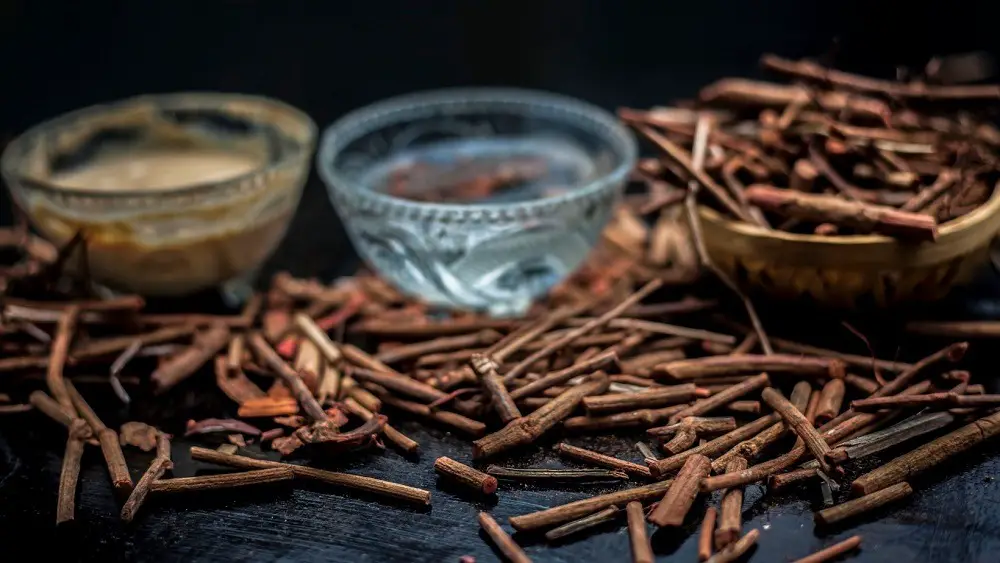There are a multitude of benefits to taking Manjistha supplements. If this is the first time you have ever come across it, welcome. It is a superfood with a huge number of positive health impacts. Once you have read this article, you are going to want to go out and buy some immediately.

What is Manjistha?
Manjistha is a plant that has long been used in forms of traditional Ayurvedic medicine. It is also known by the Latin name Rubia cordifolia, Indian madder, and common madder. The word Manjistha is Sanskrit for bright red, which is believed to be due to the plant’s association with the blood.
It is native to Asia, Africa, and parts of Europe. Specific areas the plant is prevalent include North Africa, Greece, Siberia, Nepal, Tibet, Sikkim, Pakistan. Afghanistan, India, Bhutan, Japan, China, and Manchuria.
The plant was mentioned in the ancient Indian Vedas, spiritually significant texts. It was referred to in the Aitareya Aranyaka, which is the section that discusses rituals and sacrifices in terms of philosophy and symbolism.
It has been used for centuries as a dye for clothing and in Ayurvedic healthcare. Charaka, one of the original Ayurvedic practitioners in around 150 BCE, used Manjistha as a rejuvenation agent and a detoxifier. It was also believed to help balance the different energies in the body.
How do you take Manjistha?
The root of the Manjistha plant is what is consumed to see the benefits. You can purchase it in its raw form for preparation at home, or as a powder. You can also find Manjistha tinctures that are ready to use. If you purchase raw Manjistha then you can create your own teas or tinctures from this.
If you wish to apply Manjistha topically to treat skin ailments, this is fine too. All you need to do is combine some of the powdered forms with either natural yogurt or honey. Perform a spot test first to ensure that you do not react badly to it. Once you are satisfied with this, you can apply the mixture as a face or body mask. Leave the mixture to seep into your skin for around 15 minutes before washing off with warm water.
To ensure you are consuming the correct dosage of Manjistha, we strongly recommend consulting with an Ayurvedic practitioner. Generally speaking, you should be taking up to ½ teaspoon of Manjistha powder or 2 tablets or capsules per day.
What are the benefits of Manjistha?
Manjistha is traditionally known as a lymph mover to aid with your blood circulation. It is believed to help break down blockages and deals with any stagnation in the circulatory system. This has been proven as correct in many scientific trials. Manjistha can support liver function, even in the presence of high levels of toxicity.
Your lymphatic system is a massive part of your immune system. It is the way that toxins and other waste products are removed from your body, and is vital to protect you against bacteria, viruses, and fungi. Blockages of the lymphatic system can present as extreme fatigue, weight gain, fluid retention in your hands, feet, and ankles, a sore throat, and getting ill a lot.
Manjistha supplements boost your liver’s production of glutathione, an antioxidant. This can cleanse and protect the lymphatic system. Manjistha has been clinically proven as more effective than Vitamin E and EDTA.
Manjistha supplements have also been shown to improve skin conditions such as dermatitis, eczema, and psoriasis. This is most effective when applied topically to the affected areas.
As an oral supplement, it can reduce the appearance of wrinkles and fine lines, making you appear younger. As well as this, Manjistha supplements can clear acne-prone skin. This is because the bacteria that cause acne, Propionibacterium acne, and Staphylococcus epidermidis are inhibited by the supplement.
Manjistha can also be used as a treatment for hyperpigmentation. This is caused by excess melanin in the skin settling into deposits. Manjistha can help to maintain melanin production at lower levels by inhibiting the enzyme tyrosinase, which controls melanin production.
Manjistha is also effective as a protective agent for the liver and kidneys. The supplement has strong hepatoprotective impacts and can rebalance the enzymes in your liver. This is due to the phytochemical compound rubiadin contained within Manjistha.
Manjistha supplements can help your kidneys function better. If you consistently expose your body to a lot of toxins, levels of urea and creatine can build in your blood. Manjistha supplements can reduce these levels and force them to return to normal. As well as this, the supplements can help to regulate the excretion of phosphorus, calcium, and oxalate through your urine. These are the main components of kidney stones.
It is also a very effective remedy for diarrhea. The plant is anti-bacterial and forces harmful bacteria out of your gut. It is particularly prescribed for ama atisara diarrhea, where a slimy, sticky, smelly, and mucus-laden stool is produced.
Manjistha can also help to promote weight loss. There is a lot of fiber and nutrition within the plant which reduces your hunger cues. It also forces less LDL (low-density lipoproteins) aka bad cholesterol, to be stored in your body.
Are there any downsides to Manjistha?
It is not recommended to take Manjistha if you are under 18, pregnant, or breastfeeding. There is not enough evidence to be certain of the safety of the herb and therefore is best avoided.
As with any major lifestyle or diet change, we strongly recommend that you consult a doctor first. They will be able to give you personalized advice specifically regarding interactions and contraindications with other medicines that you may be taking.
There is a slight chance that ingesting Manjistha will change the color of your urine and stool to an orange or brown hue.
If you are taking anticoagulant medication then you should be very careful with your use of Manjistha. It has been known to have similar effects and there is a chance that it could thin your blood too much.
